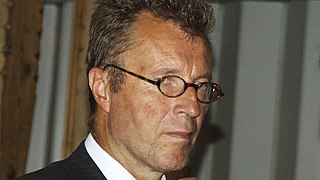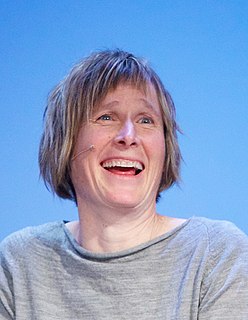Related Research Articles

SMS is a text messaging service component of most telephone, Internet, and mobile device systems. It uses standardized communication protocols that let mobile devices exchange short text messages. An intermediary service can facilitate a text-to-voice conversion to be sent to landlines.

Telenor ASA is a Norwegian majority state-owned multinational telecommunications company headquartered at Fornebu in Bærum, close to Oslo. It is one of the world's largest mobile telecommunications companies with operations worldwide, but focused in Scandinavia and Asia. It has extensive broadband and TV distribution operations in four Nordic countries, and a 10-year-old research and business line for machine-to-machine technology. Telenor owns networks in 8 countries.

Kristen Nygaard was a Norwegian computer scientist, programming language pioneer, and politician. Internationally, Nygaard is acknowledged as the co-inventor of object-oriented programming and the programming language Simula with Ole-Johan Dahl in the 1960s. Nygaard and Dahl received the 2001 A. M. Turing Award for their contribution to computer science.

Model–view–controller (MVC) is a software architectural pattern commonly used for developing user interfaces that divide the related program logic into three interconnected elements. This is done to separate internal representations of information from the ways information is presented to and accepted from the user.

The Norwegian Institute of Technology was a science institute in Trondheim, Norway. It was established in 1910, and existed as an independent technical university for 58 years, after which it was merged into the University of Trondheim as an independent college.

Kantega is a Norwegian software corporation founded in 2003 with headquarters in Oslo. Kantega primarily develops bespoke software based on Java and lightweight application frameworks. It also has offices in Trondheim and Bergen.

Halvdan Koht was a Norwegian historian and politician representing the Labour Party.

Trygve Mikkjel Heyerdahl Reenskaug is a Norwegian computer scientist and professor emeritus of the University of Oslo. He formulated the MVC (model–view–controller) pattern for GUI software design in 1979 while visiting Xerox PARC. His first major software project, "Autokon," produced a successful CAD/CAM program which was first used in 1963, and continued in use by shipyards worldwide for more than 30 years.

Torleiv Maseng is a prominent Norwegian engineer, who made some contribution to the Global System for Mobile Communications project. His work included the standard use of channel estimation and the combination of equalization, error correcting codes and modulation in which the Viterbi algorithm was used by all components.

ErgoGroup was a Nordic information technology corporation, systems integrator and consulting company headquartered in Oslo, Norway. The company provided services for IT operations, business solutions, outsourcing, infrastructure and consulting. ErgoGroup had a total of 90 offices and regional branches throughout Norway, Sweden and Finland, and was a subsidiary of Posten Norge, the Norwegian Postal Service. It was the second largest ICT operations company in Norway. The company also held partial ownership in SYSteam, TransWare, Gecko, Eiendomsverdi, Buypass, Eye-Share and Bekk Consulting. ErgoGroup merged with EDB Business Partner in 2010, creating EVRY.

Liv Køltzow is a Norwegian novelist, playwright, biographer and essayist.

Rune Slagstad is a Norwegian historian, philosopher, legal theorist, professor and journal editor. In addition to professional work, he has since the late 1960s contributed actively to public debate on a variety of issues from Norway.
Ernst Sejersted Selmer was a Norwegian mathematician, who worked in number theory, as well as a cryptologist. The Selmer group of an Abelian variety is named after him. His primary contributions to mathematics reside within the field of diophantine equations. He started working as a cryptologist during the Second World War; due to his work, Norway became a NATO superpower in the field of encryption.

Vivaldi is a freeware, cross-platform web browser developed by Vivaldi Technologies, a company founded by Tatsuki Tomita and Jon Stephenson von Tetzchner, who was the co-founder and CEO of Opera Software. Vivaldi was officially launched on April 6, 2016.
The King Olav V's Prize for Cancer Research is a research award given annually by the Norwegian Cancer Society to a researcher who has distinguished himself through his scientific contributions to Norwegian cancer research. It was established in 1992.

The University of South-Eastern Norway, commonly known as USN, is a Norwegian state university. It has campuses in Bø, Telemark, Porsgrunn, Notodden, Rauland, Drammen, Hønefoss, Kongsberg and Horten. USN is a continuation of the three former university colleges, Telemark University College, Buskerud University College and Vestfold University College, which merged between 2014 and 2016 to form the University College of South-Eastern Norway. The institution was granted the status of a full university by the King-in-Council on 4 May 2018. It has 1,360 employees and 17,152 students.
Jan Trygve Røyneland is a Norwegian television and film writer. His notable works include The Kings Choice, a film that depicted how Norway entered World War II. For this film, Røyneland was awarded the Amanda Prize for Best Original Screenplay.

Linda Eide is a Norwegian television and radio presenter, programme producer, comedian, actor and chat-show host.
Arne Halaas is a Norwegian profiled Professor emeritus in computer technology and telematics at the Norwegian University of Science and Technology (NTNU). Halaas was central in the development of the technology that led to Fast Search & Transfer ASA (FAST), which was later acquired by Microsoft for NOK 6.6 billion on April 24, 2008.

The Department of Informatics at the University of Oslo is the oldest and largest department for informatics in Norway. The department was in 2017 ranked number 1 in Norway, 3rd in Europe, and 12th in the world in Computer Science and Engineering by Academic Ranking of World Universities.
References
- ↑ "THE NORWEGIAN COMPUTER SOCIETY - One of Europe's oldest computer societies". International Federation for Information Processing. Archived from the original on April 5, 2006.
- ↑ "Member societies". CEPIS. Retrieved 2021-03-26.
- ↑ "Om oss". Dataforeningen (in Norwegian Bokmål). Retrieved 2021-03-25.
- ↑ "Om prisene". Rosing 2020 (in Norwegian Bokmål). Retrieved 2020-12-07.
- ↑ Rossen, Eirik; Sveinbjørnsson, Sigvald (2011-11-22). "Rosings hederspris til Jon S. von Tetzchner". Digi.no (in Norwegian). Retrieved 2020-12-07.
- ↑ Jørgenrud, Marius B. (2015-11-26). "Her er årets Rosing-vinnere. Den gjeveste prisen gikk til Trygve Reenskaug (85)". Digi.no (in Norwegian). Retrieved 2020-12-07.
- ↑ "Norges største forskningsbragd i IT runder 50". titan.uio.no (in Norwegian Bokmål). Retrieved 2020-12-07.
- ↑ "Rosingvinnerne 2016". Rosing 2020 (in Norwegian Bokmål). Retrieved 2021-03-30.
- ↑ Telefon, Besøksadresse Ole-Johan Dahls HusGaustadalléen 23 B. N.-0373 OSLO Norge Postadresse Postboks 1080 Blindern 0316 OSLO Norge; faks. "Rosing hederspris til Trygve Reenskaug - Institutt for informatikk". www.mn.uio.no (in Norwegian). Retrieved 2021-03-30.
- ↑ "The unexpected success of SMS". Telenor Group. 2010-10-06. Retrieved 2021-03-25.
- ↑ Mikkelsen, Solveig (2012-10-25). "Pris til Arne Halaas". www.universitetsavisa.no (in Norwegian). Retrieved 2021-03-30.
- ↑ Rossen, Eirik; Bentzen, Ann Kristin (2006-05-30). "Talegjenkjenning erobrer helse-Norge". Digi.no (in Norwegian). Retrieved 2021-03-25.